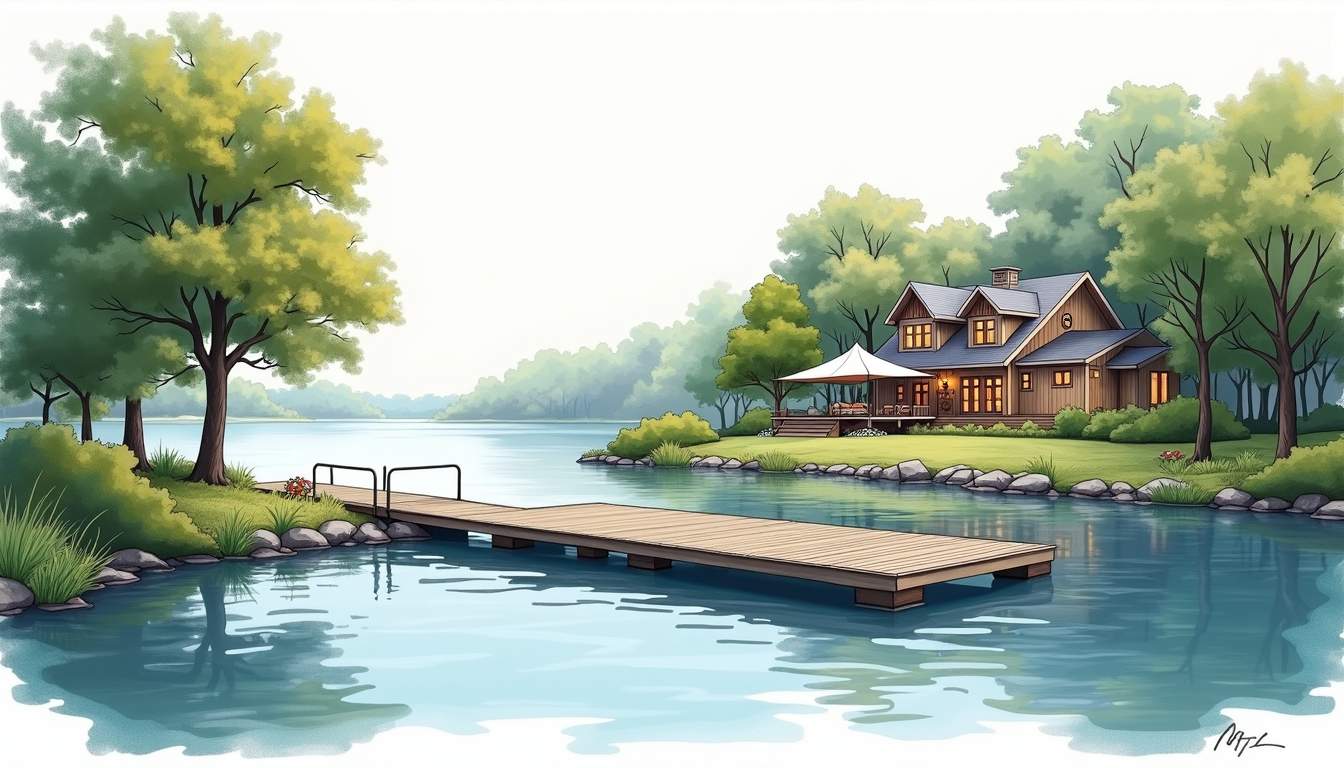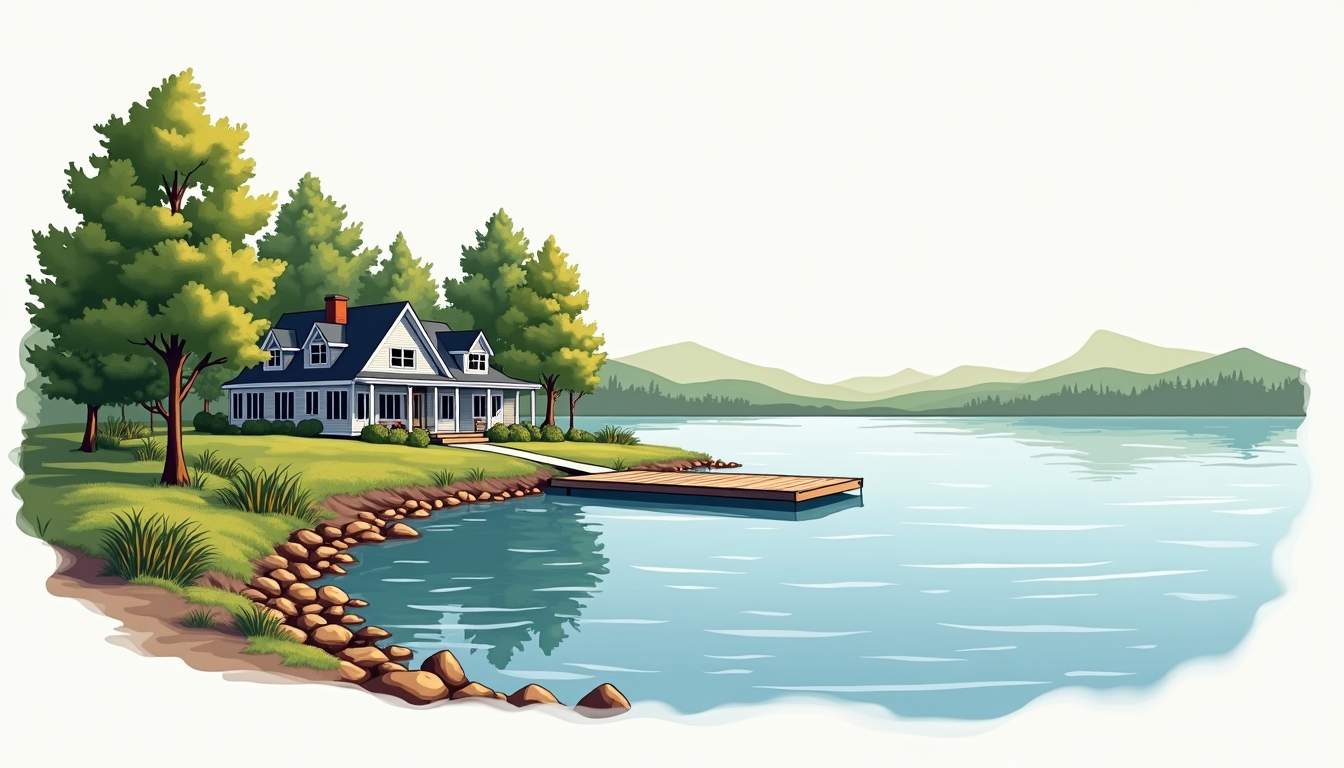
Owning a private lake home with event access opens possibilities beyond a quiet retreat: it can be a personal sanctuary, a rental income source, or a unique venue for gatherings. Navigating purchase decisions, short-term rentals, and hosting events requires attention to legal, financial, and practical details. This article lays out the key considerations, practical steps, and creative ideas for making the most of a lakeside property while protecting investment and community relationships.
Lakefront or lake-access properties carry a premium because of their scenic value, recreational opportunities, and limited supply. Buyers are often attracted to fishing, boating, swimming, and the sense of privacy that a shoreline can provide. That premium can translate into higher appreciation potential but also greater responsibility.

Risks include flood exposure, shoreline erosion, environmental regulations, and variable maintenance costs. The presence of events—weddings, retreats, corporate outings—adds complexity in terms of parking, noise control, parking, and increased wear and tear. Balancing enjoyment and stewardship is essential.
In addition to personal enjoyment, owning lake property often requires a proactive approach to environmental stewardship. Homeowners may need to collaborate with local conservation groups or comply with zoning restrictions designed to protect water quality. Consideration of septic system placement, use of fertilizers, and management of nearby vegetation can all impact the health of the lake ecosystem, influencing long-term property value and community well-being.
Moreover, lake properties can present unique challenges in terms of insurance and financing. Flood and water damage risks might necessitate specialized insurance policies that can be more costly or harder to obtain than those for inland homes. Prospective buyers should also be aware of the seasonal fluctuations in lake levels or accessibility, which can affect usability and property maintenance throughout the year. Understanding these factors is key to making an informed investment in a lakefront setting.
Purchase decisions should weigh both lifestyle and investment factors. Properties marketed for event use often differ from typical vacation homes: they may have larger lawns, accessory buildings, dedicated parking zones, or special zoning that permits gatherings. Confirming current and permitted uses is a critical first step.

Verify zoning classifications and any deed restrictions that limit gatherings or commercial activities. Some lakeside communities strictly prohibit short-term rentals or restrict the number of guests, amplified events, or amplified sound. A title search and review by a real estate attorney will reveal easements, shared access agreements, and other encumbrances that affect event viability.
Most municipalities and counties place conditions on events—special use permits, temporary event permits, occupancy limits, and parking standards. Some jurisdictions require safety plans for larger gatherings or specific trash and restroom provisions. Engaging with local planning staff early avoids surprises after closing.
Insurance requirements for properties hosting events are more involved. Standard homeowners policies may exclude commercial activity, so obtaining event-specific liability coverage or a commercial umbrella policy is often necessary. Inspect whether the insurer requires additional safety measures—fencing, lifeguard presence, or contractor vetting—before issuing coverage.
Inspections should include typical structural, electrical, and HVAC checks plus water-specific concerns: septic and wastewater systems, shoreline stability, bulkhead condition, and boat dock safety. Evaluate drainage patterns to understand runoff risks, and assess vegetation and tree stability—large trees near event spaces can be hazards.
Short-term rentals can transform a private lake house into a revenue generator, but success depends on careful market positioning and operational discipline. Analyze comparable listings, seasonal demand, and the type of guests the property will attract—families, fishing groups, brides and grooms, corporate retreat planners, or wellness retreats.
Price competitively by benchmarking local listings with similar capacities, amenities, and lake access. Highlight unique selling points—private dock, panoramic views, fire pit, boathouse, or a large lakeside lawn for events. Later, scale pricing by season, holiday weekends, and special event demand while factoring in cleaning and insurance costs associated with larger gatherings.
Use multiple distribution channels—vacation rental platforms, wedding and event vendor sites, and social media—to reach a broad audience. Maintain a professional listing with high-quality images of both the interior and the lakeside spaces, an accurate description of guest capacity and rules, and transparent information about permitted events.
Implement a booking calendar and automated messages to manage inquiries and avoid double bookings. Consider using a property manager or co-host service if local laws demand a licensed operator or if remote management becomes impractical.
Clearly communicate house rules, noise curfews, maximum guest counts, parking instructions, and shoreline safety guidelines. For events, require higher security deposits, signed rental agreements, and proof of event insurance where appropriate. Arrange professional cleaning between bookings and inspect the property before and after events to ensure standards are maintained.
Hosting events at a lake home can be rewarding and lucrative, but success relies on meticulous planning. Event hosting at a private property requires attention to logistics, comfort, and minimizing impacts to neighbors and the natural environment.
Different events demand different layouts. Weddings and formal events benefit from a staged ceremony site with clear pathways, a reception area with dance space, and a dedicated catering zone. Corporate retreats may prioritize breakout areas and quieter spaces for workshops. Map circulation routes to avoid water hazards and protect fragile shoreline vegetation.
Parking is often the biggest constraint for lakeside events. Create designated parking areas that keep vehicles off sensitive turf and consider shuttle services from nearby lots to minimize traffic congestion. Ensure ADA accessibility where required—ramps, restroom accessibility, and clear paths—both to meet legal obligations and to broaden the guest base.
Coordinate with caterers familiar with off-site service and provide adequate prep space, power, and trash disposal. Portable restrooms, hand-washing stations, and waste management plans are essential for larger gatherings if indoor facilities are limited. Confirm electrical capacity for lighting, sound, and kitchen equipment and arrange for generators as needed.
Proactive communication with neighbors and local authorities reduces conflicts. Share event dates, expected times, and emergency contact details. Establish and enforce a noise curfew and ensure sound systems are oriented away from homes. Offer neighbor parking or seating as goodwill gestures when feasible.
Stewardship of the lake and shoreline protects property value and ensures continued enjoyment. Erosion control, native vegetation, and responsible waste management reduce environmental impact. Hosting events increases foot traffic, so pathways and designated gathering zones should be used to protect sensitive areas.

Invest in bioengineering solutions—native plant buffers, coir logs, and graded terraces—to reduce erosion rather than hardening the shoreline with impervious structures. Native plants filter runoff, support wildlife, and create attractive event backdrops while minimizing maintenance.
Events can strain septic systems and local wastewater infrastructure. Limit guest numbers to levels the system can support or provide additional portable facilities. Regular septic inspections and pumping schedules prevent overflows and environmental contamination.
Safety planning protects guests and property values. A written emergency response plan should cover water rescues, medical incidents, severe weather, and fire. Ensure staff and vendors are familiar with these procedures and that communication devices function in areas with poor cell service.
When lakeside swimming is permitted during events, consider hiring certified lifeguards for the duration of the event and posting clear signage about water depth, hazards, and permitted activities. Provide life jackets, especially if guests will use boats or paddlecraft, and designate launch points that minimize boat/guest interactions.
Require vendors—caterers, inflatables, generators, bartenders—to carry adequate insurance and list the homeowner as additionally insured. Event liability policies can cover bodily injury and property damage, while cancellation insurance protects against weather-related losses. Keep copies of vendor certificates on file well before the event.
Regular maintenance and smart upgrades protect the investment and appeal to renters or event planners. Prioritize durable materials in high-traffic areas, install robust docks and walkways, and maintain landscapes to balance beauty with resilience.
Upgrades that often yield returns include expanded parking surfaces that blend into the landscape, improved exterior lighting, a dedicated prep space for caterers, and robust Wi-Fi coverage. Energy-efficient HVAC and water heaters reduce operating costs, and flexible indoor-outdoor spaces enhance appeal across seasons.
Maintain a calendar for spring shoreline inspections, dock repairs before high season, septic checks in late summer, and winterization tasks for harsh climates. Pre-event inspections should include electrical checks, path clearing, and shoreline assessment to ensure guest safety.
Successful ownership of a private lake home with event access blends hospitality, legal prudence, and environmental care. Planning—before purchase and before every event—reduces surprises and builds a reputation for responsible hosting.
Keep meticulous records of permits, insurance certificates, maintenance, and communications with neighbors and officials. Build a network of reliable vendors—caterers, lifeguards, septic professionals, and event coordinators—to ensure events run smoothly. With thoughtful management, a lakeside property can be a cherished retreat, a steady income source, and a memorable venue for life's celebrations.
Ready to embrace luxury lakeside living with exceptional event access in a premier gated community? At Tennessee National, enjoy breathtaking waterfront views, a private marina, and top-tier amenities that perfectly complement your lifestyle and hosting needs. Whether you seek a move-in ready home or a custom build, our resort-style community offers the ideal setting to create unforgettable moments. Schedule a private tour today and begin your journey to lakeside elegance and memorable gatherings at Tennessee National.